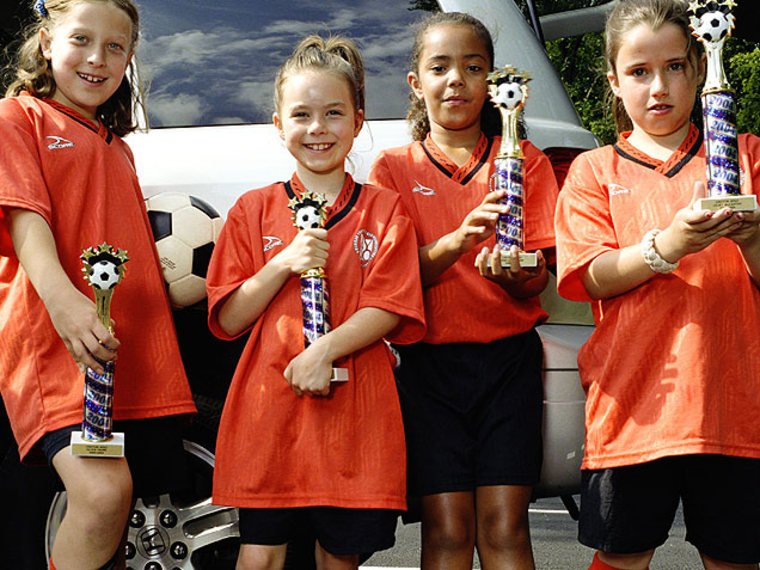My daughters were toddlers when they began taking gymnastics, their first foray into competitive sports. Just a few weeks in, they came home giddy with excitement about their upcoming "meet."
They have a meet already? I wondered, worried. They'd only been to class five or six times! Neither of them could even manage a decent summersault. They weren't ready to compete! They were going to get their perfect little leopard-leotard-covered butts kicked.
I looked at the flyer they had brought home. For just $45 a piece, they would each get the opportunity to show off their (utter lack of) moves, a t-shirt and a trophy.
"We get a trophy!" they squealed, clearly interpreting the word trophy in its old-school sense: Something you earn for winning—not just for showing up.
Not wanting to break their tiny, innocent spirits, I bought them the trophies (well, that's what it amounted to). But I also worried if such empty praise was a good thing. My worries grew as they did. Their school's jog-a-thon didn't count laps, lest the children who completed fewer laps feel bad. Their soccer teams didn't keep score (not officially, anyway—but the kids and parents certainly knew how many goals each team had scored and which kids had scored them) for the same reason. When they got to preschool and beyond, their classrooms invariably had rules like "if you don't invite the entire class to a birthday party, the invites must be mailed, not brought to school." Clearly, every effort was being made to spare children—mine included—from ever feeling even the tiniest pinch of pain or disappointment.
In the eight years since that first gymnastics class, researchers have conducted countless studies that suggest that while overpraising and overrewarding our kids may protect their fragile feelings, it does nothing to bolster their long-term happiness or success. A summary of the latest findings recently published in the Wall Street Journal acknowledges that the key lies in praising our children appropriately, which often means for their hard work and efforts, not the results of those. Even when they ace a test or win an award, the ideal response is "Wow, you worked really hard for that!" not "I knew you were a genius!"
One important study found that exaggerated praise (gushing "Oh my gosh, you're so brilliant!" when he stacks two whole blocks) can actually be harmful, causing study subjects who were told they were fabulous to feel shame when they failed subsequent tests (while kids who had been praised for their efforts—and not their innate abilities—weren't embarrassed by later disappointments).
"Children absolutely need to feel valued, accepted and loved, and this will lead to high self-esteem," the Wall Street Journal article quoted Dr. Mark Leary, a professor of psychology and neuroscience at Duke University. "But it can also be good for kids to feel bad about themselves temporarily, if they behave in selfish, mean or hurtful ways that might damage their ability to sustain relationships or hold a job in the future. The best path is a middle road, helping children develop a positive but realistic view of themselves in relation to others."
My husband says it all the time: Experience is the greatest teacher. If a child is never allowed to fall, how will she learn to get back up? If she's never given a chance to lose, how can she learn to do it with grace? If we run after her for the rest of her life with her forgotten homework/sweater/lunch, where's her incentive to remember it on her own? Of course it's hard to watch our children hurt. But if we want them to grow into capable, resilient adults, we have to let them learn some things the hard way.
The good news is, kids are tougher than we think. And also, thank God for wine.
Jenna McCarthy is an internationally published writer, TED speaker and the author of five books including If It Was Easy They'd Call the Whole Damn Thing a Honeymoon: Living with and Loving the TV-Addicted, Sex-Obsessed, Not-so-handy Man You Married (Berkley Books, 2011). Find her at JennaMcCarthy.com.
A version of this story originally appeared on iVillage.
